The best 2022 solar water heaters for whole-house residential use (not for pools, hot tubs or camping shower bags!) are available in two types, active and passive models.
Active vs. Passive Solar Water Heaters
The first major decision you have is which system type to select – and your local weather and climate are going to be a major factor.
In short, you can install either active or passive system in a warm climate, but where winter freezes are possible, an active system that employs antifreeze is essential. — These are indirect systems.
Here are more details describing each type:
Passive solar water heaters rely on water pressure from a municipal water supply or a well pump to move heated water from the tank through your plumbing. They are easier to install and cost significantly less. Heated water rises into the storage tank through convection/buoyancy in thermosiphon systems or it flows to the storage tanks in integrated models.
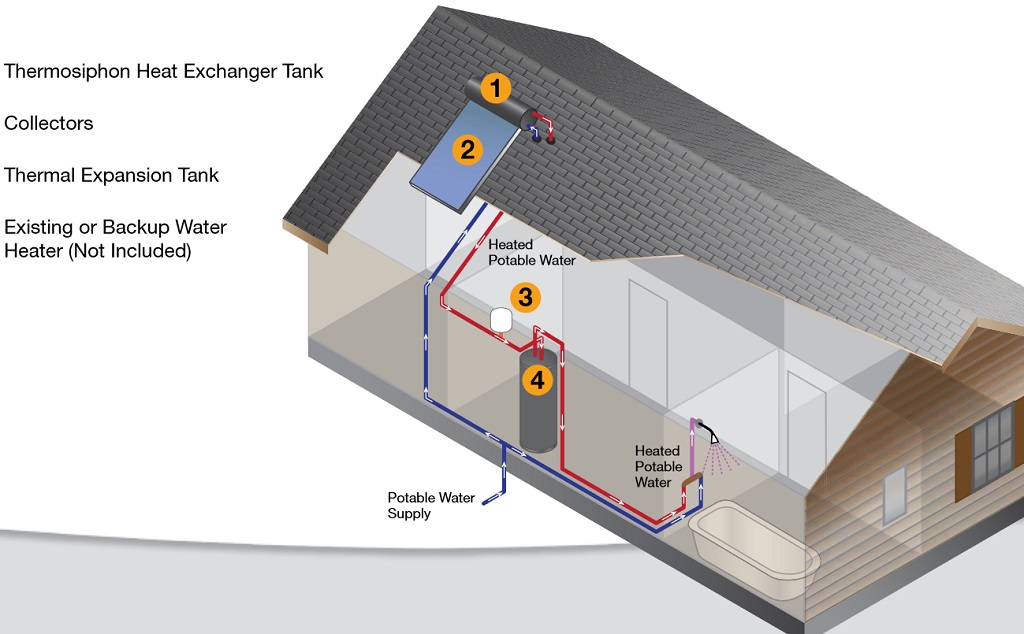
Active solar water heaters have circulation pumps circulating antifreeze plus more control features to regulate temperature and protect the unit from freezing in cold weather.
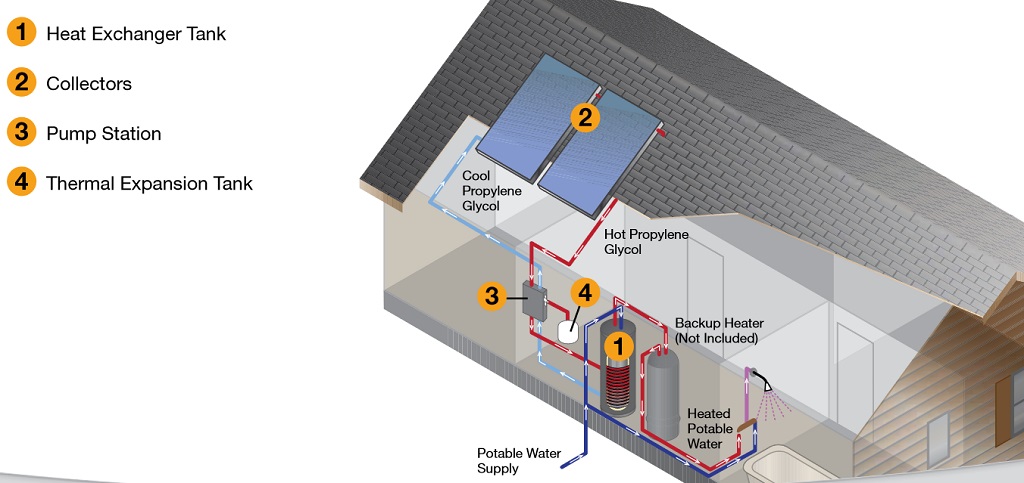
Direct vs. Indirect Water Heating
Direct systems heat potable water sent directly to a storage tank or tankless water heater for use as domestic hot water – the water coming from your hot water taps or connected to a dishwasher or clothes washer.
Indirect systems circulate antifreeze, usually propylene glycol, that is heated in the solar collectors. The heated liquid is pumped through a coil of pipe in a hot water storage tank or through a heat exchanger that transfers heat to the potable water in the tank.
Top Solar Water Heaters in 2022
- Duda SUS304 240 Liter – Passive
- Sunbank 80 Gallon – Passive
- Rheem SolarAide – Passive
- Apricus WOMBAT Pressurized ET – Thermosiphon Solar Water Heater (Passive)
- Duda Standard 240 Liter – Passive
- Apricus PV Powered – Split Pump Forced Solar Water Heating System (Passive)
- Rheem SolPak with Electric Backup 80 Gallon – Electric Solar Water Heater (Active)
- Duda 300 Liter – Active
- Sun Earth SolaRay 2 – Active
- Northern Lights SWH-2 – 2 x TZ58 1800 30R – Active
Our Product Selection and Reviews Approach / Methodology
There aren’t a lot of manufacturers making solar water heaters, and some of what’s available is junk. We’ve researched the top brands and put together a list and reviews of the very best options. These are complete kits.
You also have the option of buying system components – collectors or thermal panels, storage tanks, pumps, etc. to build a solar water heater system customized to your situation.
Complete systems give you the confidence that you have all the equipment needed and all the individual components are designed to work together.
Separating Equipment and Professional Installation Costs
The costs given below are for equipment only. Installing one is a popular DIY project. If you hire an installer or work with a contractor that provides a full-service including equipment and installation package, professional labor costs will range from about $800-$1,900 for a passive system to more than $2,500-$3,900 for an active system, depending on the scope of the project and your home’s location.
Top Passive Solar Hot Water Systems
Passive solar water heaters cost less but are less efficient than direct models. They’re the most popular type, and most use the thermosiphon, aka thermosyphon, method to store heated water.
The Whole Building Design Guide gives an excellent overview of the types, design, and performance of active and passive, direct and indirect solar water heaters.
Duda SUS304 240 Liter Passive Solar Water Heater
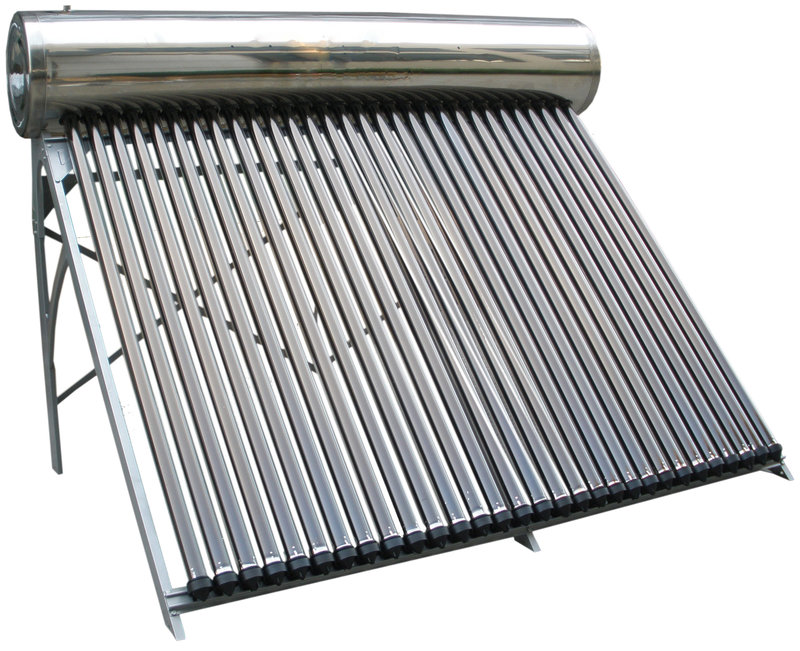
Duda Diesel makes the same style solar water heater available with storage tank sizes that range from 150 liters (40 gallons) to 300 liters (80 gallons).
This 240-liter (64 gallon) size is most popular, but you’ve got options to suit different needs.
This all-in-one system connects directly to your potable water tank.
Type: Passive direct water heating.
Storage: 64 gallons
Performance: Duda’s collectors are 94% efficient in transferring heat into the water. The system is pressurized by a city water system or well.
Top Features: This unit has a 304 stainless steel tank outer shell, which is much more corrosion-resistant than the standard Duda systems with painted, galvanized tanks. It’s ideal for coastal climates and those with pollution issues.
An electric water heating element is included, and the controller includes a timer for backup electric water heating.
Each collection tube is 10 liters, so this model has 24 tubes and comes with 8 spare tubes.
Pros and Cons: It’s a passive system, so it isn’t as efficient as an active system because there is more standby heat loss.
However, the cost of this passive system is lower, and Duda has a good reputation for quality.
The 3-year warranty is shorter than average for solar water heaters. This unit isn’t designed for freezing temperatures.
Cost: $2,900 – $3,500
Best Use: Warm climates. The design of passive solar water heaters, with the storage tank outdoors, is best for regions of the US that do not experience freezing temperatures. A system this size serves most homes with 1-2 bathrooms, but again, a range of Duda system sizes are available.
Sunbank 80 Gallon Solar Water Heater
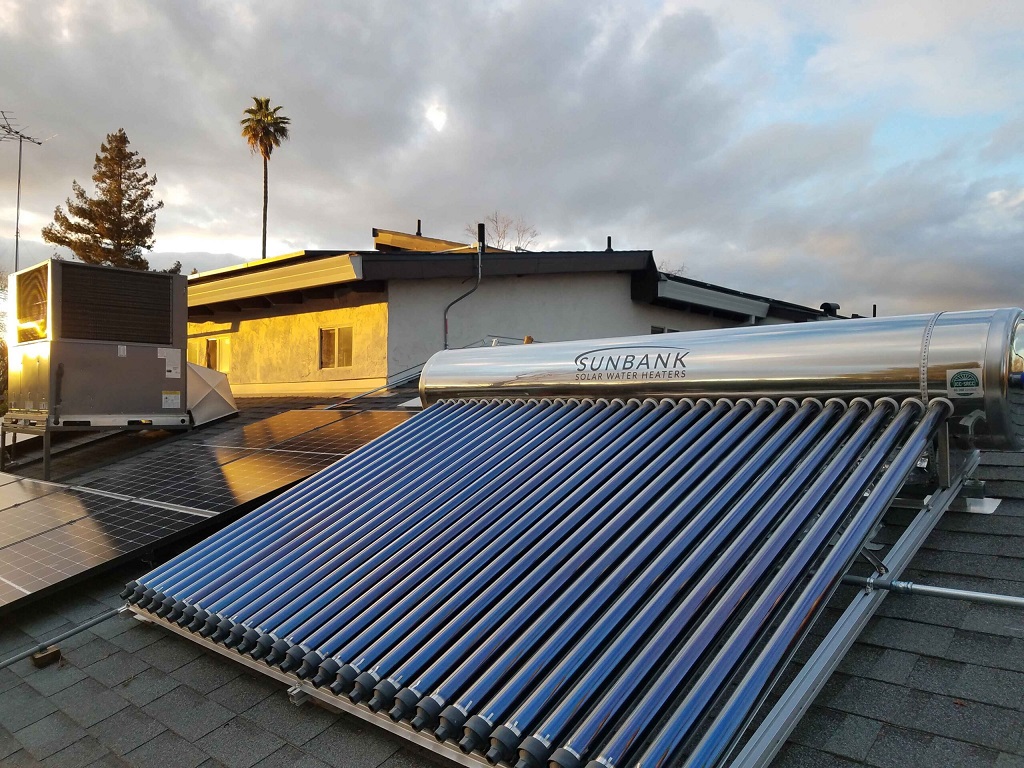
This complete kit includes 30 evacuated tube collectors serving the 80-gallon tank. A corrosion-resistant aluminum mounting bracket is part of the kit. The bracket can be set to 30 or 45-degree angles for optimal collection given the slope of your roof.
Sunbank designed this unit to serve as a pre-heater to a standard water heater or as a stand-alone system. A 220-volt electric heating element is included for use when natural sunlight isn’t sufficient to heat the water or there’s a temporary high demand for heated water.
Type: Passive, direct
Storage: 80 gallons. A 40-gallon model is also available.
Performance: Sunbank claims a 92% absorbency efficiency. Depending on sunlight and air temperature, this solar water heater can generate the equivalent of 12.6 kW hours per day, or 43,000 BTUs.
Top Features: The system includes an 80G tank with 316 stainless inner tank and 304 stainless outer tank, 30 tubes and electronic controller. A back-leg assembly for flat roof or ground mounting and a recirculation pump kit ($200) are accessories.
Pros and Cons: The unit is built with quality components backed with a 10-year warranty on the collectors, better than average for the industry.
This unit SRCC certified, meaning it’s eligible for the 26% federal solar tax credits including the complete installation cost. It’s also eligible for local incentives for solar water heaters.
The controller and other parts have a 1-year warranty, which isn’t very good relative to other brands. This is a good DIY kit.
Cost: About $4,000 – $5,000
Best Use: Southern US. Like most passive systems, this unit is best installed where freezing isn’t likely. This Sunbank solar water heater serves most homes with two bathrooms, or a household of 2-4 people.
Rheem Solaraide Passive Solar Water Heater
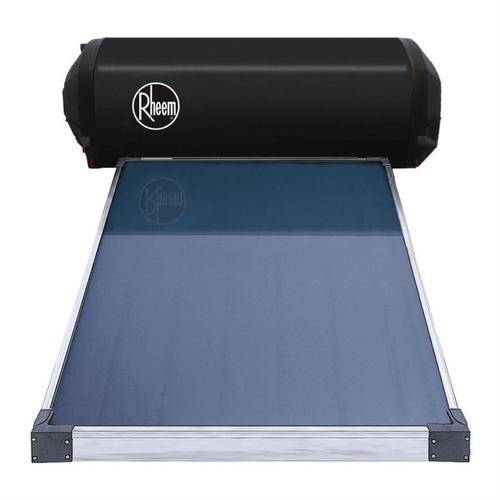
Rheem has a good track record of manufacturing water heaters or all types that deliver quality and dependability.
The Rheem SolarAide system is a passive solar water heater and available in a 47-gallon size with one flat panel collector and an 80-gallon version with two panels.
Type: Passive, indirect
Storage: 47G and 80G systems.
Performance: Heat absorption in the 90%-94% range with a solar energy factor, rated by the Solar Rating Certification Corporation (CRCC) of 1.3 to 1.5. This means that 1.3 to 1.5 times more energy is delivered by the system than is put into it.
Top Features: Steel tank with enamel tank lining, copper sheath backup heat element and flat-plate polyester powder-coated panels with multi-flow risers.
Pros and Cons: This is an affordable system with efficient flat plate collectors and a backup heating element. However, it doesn’t have a controller, so you can’t use a timer with the backup element. When the water cools, the element turns on regardless of whether there’s a hot-water demand.
The 80-gallon system gives you more value than the 47G unit. The 5-year warranty is better than average and covers all parts. Rheem makes electric and gas-fired tank-style water heaters that can be used with this system. Tankless units are an option too.
Cost: $2,500 – $2,900 for the 47-gallon unit and about $4,200 for the 80-gallon system.
Best Use: Warm, sunny locations. This system is designed for areas where freezing temperatures are uncommon. Rheem rates the 47-gallon system for homes with 1 or 1.5 bathrooms and the 80-gallon version for 2 or 3 bathrooms.
Apricus WOMBAT Pressurized ET Thermosiphon Solar Water Heater (Passive)

This system is designed like most passive systems with evacuated tube collectors with a tank mounted above. As water is heated, it rises into the tank and is ready for use.
Type: Passive. It is a direct system, so it connects to your potable water supply through a tank or tankless equipment.
Storage: Systems are available from 150 liters/40 gallons to 300 liters/80 gallons.
Performance: Expect efficiency ratings of about 93%. Apricus Wombat systems are used as stand-alone water heaters and, in cooler climates where incoming water temperature is lower, as pre-heaters to serve a traditional water heater.
Top Features: The inner tank is SUS304 stainless with 50mm polyurethane insulation. The outer tank is PVDF coated, and high-grade copper is used for the water pipes.
Pros and Cons: Four sizes give you options for use in homes with 1-3 bathrooms. The unit is easy to install and integrate with your existing plumbing and water tank.
Apricus does not include an electric heating element as standard – it is an option.
Cost: $3,000 – $5,500 based on the system size.
Best Use: Warm and moderate climates. With freeze-resistant heat pipes, the Wombat is OK for locations with short-term freezing.
Duda Standard 240 Liter Passive Solar Water Heater
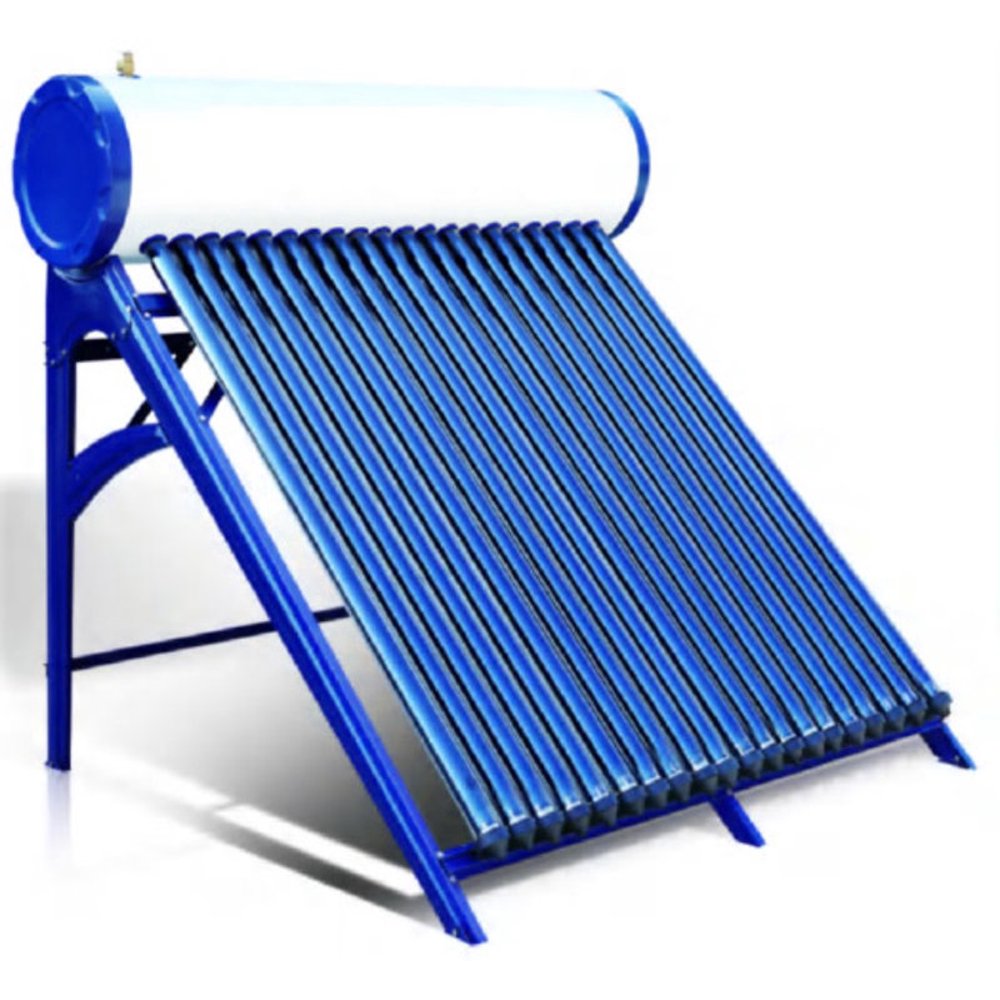
This is the entry-level Duda 240-liter solar water heater. The inner tank lining is SUS304 stainless, but the outer shell is zinc-coated steel, similar to galvanized, rather than stainless.
All performance and features information are the same as the unit above and is available in 150 to 300 liter capacities.
Type: Passive direct water heating.
Storage: 240 liters / 64 gallons
Performance: Pressurized with 94% efficiency.
Top Features: An electric water heating element is included, and the controller includes a timer for backup electric water heating.
Pros and Cons: This is an affordable option for homes where a limited amount of hot water is required. The unit can be used to pre-heat water too as a way of lowering gas or electric costs.
The 3-year warranty on all parts is below-average.
Cost: $2,500 – $2,900
Best Use: Warm and temperate climates. The design of passive solar water heaters, with the storage tank outdoors, is best for regions of the US that do not experience freezing temperatures. A system of this size serves most homes with 1-2 bathrooms, but again, a range of Duda system sizes are available.
Top Active Solar Hot Water Systems
These units have an integrated pump to circulate water or antifreeze.
Apricus PV Powered Split Pump Forced Solar Water Heating System
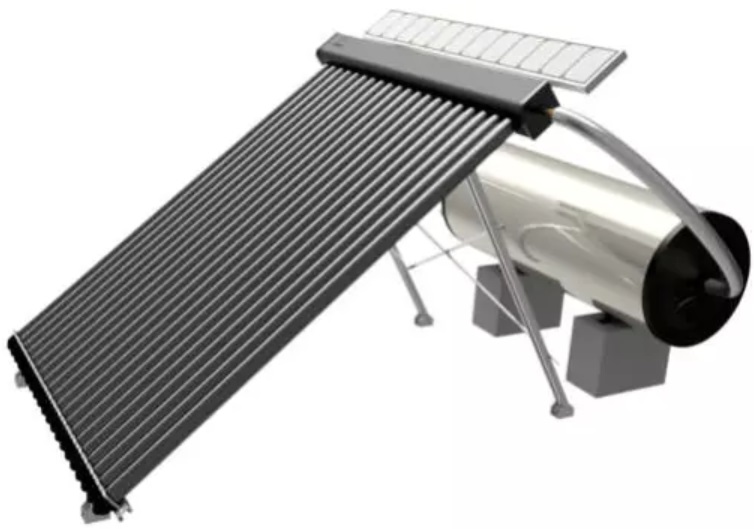
This complete package includes a 200 liter / 52-gallon tank, pump kit, 40-watt PV panel for electric supply to the pump and evacuated tube collectors. All necessary fittings, pipe and a safety valve come with the kit.
Type: Active, directly connected to potable water supply.
Storage: 200 liters / 52 gallons
Performance: Thermosiphon design with a solar energy factor of about 1.4.
Top Features: The 2.2mm mild steel tank is enamel-lined and insulated with 58mm high-density foam. Frames, brackets, and mounting equipment are powder-coated galvanized steel. This is a complete kit.
Pros and Cons: The higher cost of an active solar water heater gives you the option to install it in climates where freezing weather occurs – though we don’t recommend this for regions with long winter freezes. The integrated 40W PV collector eliminates the need for wiring to the unit.
Cost: $7,500 – $8,200
Best Use: Warm-to-cool climates. This unit is ideal for all but the coldest climates. It will serve most homes with 1.5 to 2 bathrooms and 3-4 person households.
Rheem SolPak with Electric Backup 80 Gallon Electric Solar Water Heater

This active solar water heater uses a flat plate collector and includes a storage tank, controller, pump, mixing valve and all fittings.
Type: Active, direct water heater supplies potable water.
Storage: 65-galon, 80-gallon, and 120-gallon tanks are available.
Top Features: Flat plate collectors are available in 3 x 8, 4 x 8, and 4 x 10 sizes. This is a complete kit with everything you need for installation.
Pros and Cons: While costly, this system gives you options to customize it to your household hot water needs and your climate conditions.
The 6-year warranty is about average for quality solar water heaters.
Cost: $8,000 – $9,500 depending on the tank size and local cost factors.
Best Use: All but the northern US. This Rheem SolPak solar water heater is designed for all but the coldest climates. It has enough capacity in most climates for large homes and households. It can also be used in light commercial applications.
Duda 300 Liter Solar Water Heater System
This is a weather-tough, closed loop system with collector, tank, pump, and installation materials. This is an indirect unit. The glycol solution heated outdoors travels through a pipe integrated in the indoor storage tank. Heat is transferred from the pipe into the water.
The system can be used to pre-heat water or, when incoming water is fairly warm, heat it to usable temperatures.
Type: Active, split tank style. Water is heated using the collectors. Rather than utilizing an outdoor tank, it is pumped into an indoor storage tank to eliminate freeze issues.
Storage: 300 liters / 80 gallons
Top Features: Pressurized system that includes an evacuated tube solar collector, stainless steel-lined tank, controller (called a working station), submersible pump, mixing valve, food-grade propylene glycol and expansion tank.
Pros and Cons: This is a full system in an affordable price range. Pro installation is recommended for optimal results.
The warranty is below-average, 1-3 years for various parts.
Cost: $3,900 – $5,900 based on the specific components and accessories you choose.
Best Use: This system is ideal for warm-to-cool climates, but not where sustained freezes are likely. The system should serve up to 3 separate locations at once such as a shower, faucet, or appliance.
Sun Earth SolaRay 2 Solar Water Heater
This is an indirect, active system that utilizes industrial-grade propylene glycol as the heat carrying medium. The SolaRay 2 is rated for extreme climates with a tolerance to -60F.
Type: Indirect, Active
Storage: Tanks with 80 and 120 gallons of capacity are available.
Top Features: Rather than put together systems, Sun Earth gives customers a range of liquid flat plate collectors that can be chosen to customize your system. The collectors, up to 4 x 8, deliver 120 to 130 BTUs per square foot per hour.
Pros and Cons: This is a costlier brand but one that gives you more options for an active, indirect system.
Cost: $6,700 – $9,500
Best Use: SolaRay weather-resistant systems are a good choice in very cold climates where sustained periods of below-freezing temperatures are common.
Northern Lights SWH-2 – 2 x TZ58 1800 30R
This is a direct, active system that heats water for potable, domestic use. The kit contains everything needed and is a popular DIY system.
Type: Active, direct.
Storage: 80 gallons
Top Features: The tank includes a 4.5 kW electric backup heating element and two heat exchangers for maximum efficiency.
A FlowSol solar pump with a digital controller and 100 feet of stainless-steel piping give you insulation options.
High-temp propylene glycol fluid, 24-liter expansion tank and a drill pump for charging the system are part of the package.
Pros and Cons: This system is complete and DIY-friendly. Fittings are a quick-connect style that don’t require soldering. This Northern Lights solar water heater is a one-size-fits-all kit, so you don’t have options to tailor it to your needs. The collectors are covered by a 10-year warranty; all other parts are backed for 3 years.
Cost: $8,400 – $10,500
Best Use: All but the coldest US climates. This unit is usable in most climates, even those where freezing is possible. A system of this size will serve 3 hot water locations.
Tip: If you are currently exploring solar hot water heaters to save money on your hot water bills, you may also be interested in solar panels for homes to help you save money on home electricity costs.
Conclusion
When comparing the top solar hot water systems available on the market today, always look for an SRCC rated/certified system to make sure you are eligible for the 26% Federal Solar Tax Credits that apply to the full amount of the job including equipment costs, building permits, and installation. Some local city and state governments also offer incentives for energy-efficient home upgrades like solar water heaters.
Before a solar hot water system can be mounted on your home’s rooftop, you will need to make sure that your current roof is in good shape and still has a sufficiently long lifespan left to justify the initial expense to install a solar hot water system.